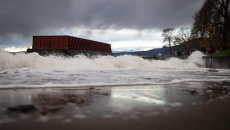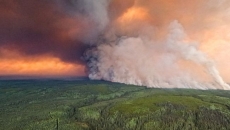At a time when skeptics are questioning Canada's plan to ramp up immigration, a new report argues the country needs to welcome a lot more newcomers to counterbalance its aging demographic.
A Desjardins report released Monday analyzes how much population growth among working-age Canadians is necessary to maintain the old-age dependency ratio, which refers to the ratio between 15 to 64-year-olds and those aged 65 and older.
It finds that the working-age population would have to grow by 2.2 per cent per year through 2040 to maintain the same ratio that existed in 2022.
And if the country wanted to go back to the average old-age dependency ratio it had between 1990 and 2015, that group of Canadians would have to grow by 4.5 per cent annually.
"I feel like the discussion around immigration levels in Canada, by and large, focuses on the immediate impact on the Canadian housing market," said Randall Bartlett, Desjardins' senior director of Canadian economics.
"And so what I wanted to do was sort of zoom out and provide some broader economic context around immigration and why immigration to Canada is important."
The prospective ramp-up of immigration levels has sparked debate on whether the country can handle higher flows of newcomers amid a housing crisis, and what the total economic impact of having more people in the country would be.
Canada's population grew by more than one million people last year, a record for the country. Its total population grew by 2.7 per cent, the fastest rate since 1957.
The strong population growth comes as the Liberal government eyes higher annual immigration targets, which would see the country welcome 500,000 immigrants per year by 2025.
Proponents of higher immigration argue that the labour market is able to absorb more workers, and the country needs more working-age Canadians to support the tax base as more people retire.
"We need immigration at a relatively high rate, actually, in order to offset the economic impacts of aging — to be able to pay for the health care that Canadian seniors are going to need," Bartlett said.
A recent Desjardins analysis finds Canada's plan to increase immigration could boost gross domestic product per capita if newcomers continue to have the same success getting work that they've enjoyed recently.
GDP per capita is the size of a country's economy divided by its population. Many consider it to be a better measure of a country’s living standards than the overall GDP figure.
The employment outcomes of recent immigrants, particularly those brought in through the economic stream, have improved compared to those of previous cohorts. That's in part because of changes to federal immigration policy.
In 2018, the median wage of economic immigrant principal applicants surpassed that of the Canadian population by the time they had been in the country for one year, according to Statistics Canada.
"We're bringing in very, very talented people," Bartlett said. They are able to find jobs and "generate earnings very quickly that are outpacing the Canadian average," he added.
But critics argue that relying on immigration to supply workers for the economy can also serve as a disincentive for businesses to invest in technology that would boost labour productivity and reduce dependency on workers.
Bartlett said the federal government could modulate the flow of temporary foreign workers so as to encourage such investments.
But he conceded that housing serves as a major hurdle.
Desjardins estimates the country would need to build 100,000 more units every year to offset upward price pressures caused by having a higher number of permanent residents in the country.
A recent analysis by BMO found that for every one per cent of population growth, housing prices typically increase by three per cent.
The influx of newcomers into the country is already having an effect on the housing market, which rebounded this year despite interest rates being at their highest level in decades.
At its last interest rate decision, the Bank of Canada flagged population growth's effect on housing prices as one of the factors feeding into inflation.
"Strong population growth from immigration is adding both demand and supply to the economy: newcomers are helping to ease the shortage of workers while also boosting consumer spending and adding to demand for housing," the central bank said in a press release on its latest rate hike.
Bartlett warned the erosion of housing affordability amid record population growth could damage public support for immigration and warrants swift action from government.
"There's a risk Canadians could become less open and less positive … toward immigration," Bartlett said.
"If that leads to scaling back immigration in a meaningful way, then that means Canadians are gonna be facing a significant bill going forward to meet the aging costs of older Canadians."






